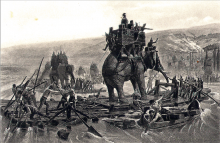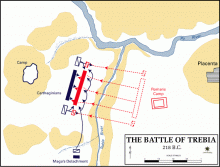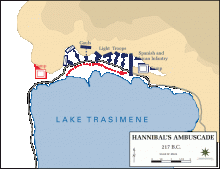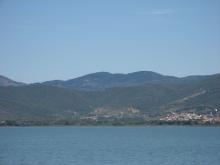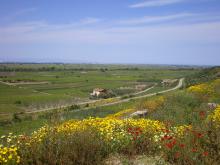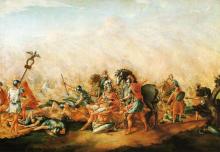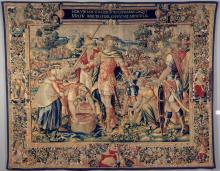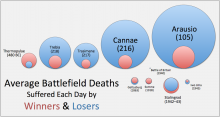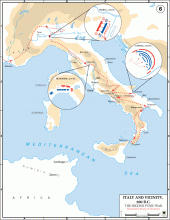Hannibal's stunning victories in Italy. He defeats the Romans at the Battle of Trebia in late December 218 BC (1–2). Disease costs him the use of his right eye, but he still manages to direct the ambush at Lake Trasimene in late June 217 BC (3). Hannibal annihilates two consular armies at the Battle of Cannae on 2 August 216 BC (4).
Supplementary Essay on Chapter 4: the Battle of Cannae and its Legacy
(1) cōnflīxerat and pepulerat: pluperfects expressing action completed before the crossing of the Alps in 3.4. Having told the story of Hannibal's march from Hispania to Italy in Chapter 3, this chapter will focus on his battles in Italy.
apud Rhodanum: "near the Rhône," a major river in southwest Gaul that flows into the Mediterranean near Marseilles. Not to be confused with the Island of Rhodes, Rhodus –ī f. Nepos exaggerates the scope of this battle, the first clash of the war between Roman and Carthaginian forces. It was, at most, a confused skirmish between small detachments of cavalry fought soon after Hannibal’s forces crossed the Rhône, and before the arrival of Scipio’s main force. After the skirmish, the bulk of Scipio’s force continued towards Hispania; Hannibal moved north towards the Alps.
apud: with a place name, apud always means "near"; it never means "in" (AG §428d).
cum P. Cornēliō Scīpiōne cõnsule: Publius Cornelius Scipio was consul in 218 BC. He would die in Hispania in 211 BC while fighting Hannibal’s brother, Hasdrubal. His son, Scipio Africanus, would defeat Hannibal at the decisive Battle of Zama in 202 BC.
hōc eōdem: i.e., Publius Cornelius Scipio.
Clastidī: locative. Clastidium was a fortified town in Gallia Cispadana near the Po River (apud Padum). Captured from the Gauls in 222 BC, the town served as an important supply base for the Romans.
dēcernit: generally "to decide"; when applied to military affairs, decernō means "to decide by combat" → "to fight."
sauciumque inde ac fugātum: adjective and participle agreeing with implied Scipionem.
inde ac: "and then, and thereafter"; Nepos is careful to clarify that Scipio was wounded first and then retreated. Nepos' description is more appropriate for the Battle of Ticinus, a cavalry skirmish in late November or early December.
(2) tertiō: "for the third time"; Nepos refers to the Battle of Trebia, a small river that flows into the Po River near Genoa.
īdem Scīpiō: i.e., Publius Cornelius Scipio; remember that Scīpiō is a third declension noun.
cum collēgā Tiberiō Longō: after Scipio was wounded at Ticinus, his co-consul Tiberius Sempronius Longus was recalled to confront Hannibal. He had recently taken Malta from the Carthaginians in preparation for the planned invasion of Africa.
adversus eum: preposition ("against") + accusative.
manum cōnseruit: a common idiom, "to join hand[s]" → "to join hand to hand (in battle) → "to fight, join battle with," often with cum + ablative, hīs (i.e., Scipio and Longus).
per Ligurēs: the Ligurians lived in Gallia Cisalpina, near modern day Genoa. Roman authors often refer to a place by reference to its inhabitants.
Appennīnum: the Apennines are a major mountain range extending the length of peninsular Italy.
Etrūriam: Etruria is a region in north central Italy.
(3) hōc itinere: i.e., the march to Etruria (see 3.3).
adeō: signals the upcoming result clause, ut…ūsus sit.
gravī morbō: ablative of means. During his illness, Hannibal was carried on his one surviving elephant, a massive Indian elephant nicknamed Syrus or "The Syrian," which had a prosthetic metal tusk.
adficitur: historical present referring to a past action as though it is happening now. It was felt that this added vividness and excitement to the description (AG §469); Hannibal is the subject.
dextrō: ablative with the deponent verb, ūsus sit (AG §410).
quā valētūdine: "by this affliction"; valetūdō can refer to good or bad health. quā: connective relative (AG §308f; see above 2.4).
cum etiam tum premerētur lectīcāque ferrētur: concessive cum clause (AG §549), "although at the time...."
C. Flāminium...circumventum occīdit, neque multō post C. Centēnium...occupantem: Nepos deploys two parallel participial phrases to describe two Roman defeats. Each phrase is introduced by the name of the defeated Roman leader and concludes with a participle that agrees with the leader; other information about the battle is enclosed within the participle phrase [color-coded schematic of sentence structure].
C. Flāminium cōnsulem: after he was re-elected consul, Gaius Flaminius Nepos raised four new legions and marched north to meet Hannibal. As censor in 221/220 BC Flaminius oversaw the construction of the Circus Flaminius in Rome and the Via Flaminia, which connected Rome with Ariminum on the Adriatic coast.
Trasumēnum: Lake Trasimene, a large, picturesque lake in Umbria, about 85 miles north of Rome; according to Livy, it was "a place born for an ambush" (22.4.2). [Trasimene: battle schematic] [image: Lake Trasimene] [supplementary text: Livy recounts how the Romans responded to the disaster at Trasimene]
circumventum: participle agreeing with Flāminium, not Trasumēnum. [image: Sylvestre, Decapitation of Flaminius at Trasimene]
neque multō post: adverbial, "not much after"; multō: ablative of degree of difference.
C. Centēnium: A few days after the Battle of Trasimene, Hannibal intercepted and annihilated a force of 4,000 elite cavalrymen (cum dēlectā manū) led by the propraetor Gaius Centennius.
saltūs: accusative plural object of occupantem; although in the singular, saltus refers to a narrow passage, in the plural it can refer to woods that contain clearings (compare 3.3).
(4) obviam: "towards, against, to meet" + dative, eī, with verbs of motion, venērunt.
duo cōnsulēs: Gaius Terentius Varro and Lucius Aemilius Paulus, allies of the Scipios, had campaigned for the consulship as staunch critics of Fabius Maximus’ strategy of avoiding direct action against Hannibal (see 5.1). Despite his role in the defeat at Cannae, Varro continued to hold important military positions. Lucius Aemilius Paulus was killed at Cannae; his daughter, Aemilia Tertia, married Scipio Africanus. [image: Trumble, Death of Aemilius Paulus]
utrīusque exercitūs: exercitūs is accusative plural, the object of fugāvit, "he routed," whose subject is Hannibal.
Cn. Servīlium Geminum: consul of 217 BC; after the disaster at Trasimene, Gnaeus Servilius Geminus led the fleet tasked with coastal defense of Italy and harassing raids against Carthaginian territory in north Africa.
superiōre annō: "in the previous year." The other consul from the previous year also fell in the battle, as did 2 quaestors, 29 of the 48 military tribunes, 80 Roman senators, and a multitude of wealthy men who served in the cavalry. Again we find Nepos consciously avoiding a detailed account of military events. Even so, this is a surprisingly brief statement about the Battle of Cannae, the worst defeat suffered by Rome during the Second Punic War—and Hannibal’s greatest triumph.
Supplementary Essay on Chapter 4: the Battle of Cannae and its Legacy


